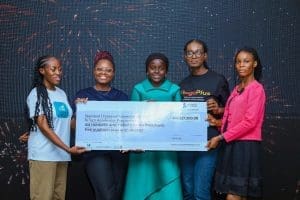Standard Chartered Bank Ghana has awarded GH₵627,500 in grants to five female-led businesses as part of its Futuremakers Women in Tech programme, recognising their innovation and potential to address Ghana’s pressing economic and environmental challenges through technology. The grants were announced at the Pitch Day and Graduation event held on October 15, 2025, marking the completion of the programme’s fifth cohort.
The five winning enterprises, selected from a pool of ten finalists who completed six months of intensive capacity-building, are Wobil Technologies Ltd, GoGo Plus, WaxFarm, AgriEase, and Lbh Farm. Each winner receives GH₵125,500 in equity-free grants to scale their technology-enabled ventures. The award amounts position Standard Chartered’s commitment toward supporting women-led innovation that extends beyond capital provision to encompass mentorship and market access.
The Pitch Day celebration brought together investors, ecosystem leaders, alumni entrepreneurs, and development partners to witness the tenth cohort of female business leaders present solutions addressing diverse sectors. The event featured dynamic pitches before an esteemed judging panel drawn from Ghana’s technology and entrepreneurship ecosystem, with presentations showcasing tech-enabled solutions targeting agriculture, health, education, and sustainability challenges.
The Futuremakers Women in Tech programme, now in its fifth year, has supported 74 women-led businesses since its 2020 inception. Of those, 21 enterprises have received total seed funding of US$210,000 (Ghana cedi equivalent), with supported ventures spanning agriculture, fashion, renewable energy, health, education, and sustainability sectors. The programme demonstrates consistent track record of identifying scalable, high-impact businesses led by women entrepreneurs.
Systemic barriers remain substantial despite women’s significant economic contribution to Ghana. Women own 34 percent of formal small and medium enterprises and 44 percent of micro-enterprises according to data from the World Bank and Ghana Statistical Service respectively, yet face persistent constraints including limited access to finance affecting 65 percent of women entrepreneurs, digital skills gaps impacting 40 percent, and regulatory hurdles affecting 35 percent, according to Mastercard’s 2023 index.
Mansa Nettey, Chief Executive of Standard Chartered Bank Ghana, described the programme as a strategic investment in Ghana’s future. She emphasised that empowering female entrepreneurs represents both economic necessity and moral imperative for sustainable growth and innovation. The finalists, Nettey noted, have demonstrated “exceptional grit, creativity and confidence” that extends far beyond competitive results, positioning them as changemakers shaping Ghana’s economic future.
The programme’s implementation through Ashesi University’s Ghana Climate Innovation Centre ensures participants receive not only capital but also structured business development training, leadership coaching, and digital innovation instruction aligned with local market realities. The centre adopts a gender-sensitive curriculum designed to address the specific challenges women entrepreneurs navigate whilst operating in underserved or informal markets.
The event included a keynote address from Dr. Amanobea Boateng, International Gender Consultant and founder of the Women’s DNA Fund, who discussed merging profit with social good and the strategic importance of building strong professional networks. Her remarks underscored that successful entrepreneurship increasingly depends on ecosystem connectivity rather than capital alone.
A significant programmatic addition emerged from the event: the official launch of the FWIT Alumni Network. The network creates a dedicated community providing ongoing support, mentorship, and networking opportunities for all programme participants beyond the initial incubation period, addressing a critical gap in long-term venture sustainability and founder peer support.
The timing of this award cycle coincides with renewed momentum in Standard Chartered’s women-focused entrepreneurship strategy. In March 2025, the bank announced a three-year expanded commitment to the Futuremakers Women in Tech programme across ten markets in Africa, the Middle East, and Pakistan. That commitment targets 400 women entrepreneurs to receive support building thriving microbusinesses, with the initiative aimed at enabling and supporting over 1,200 jobs whilst distributing nearly US$1.9 million in catalytic grants.
Success stories from earlier cohorts provide evidence of the programme’s transformative potential. Sabon Sake, a venture supported in prior cohorts, expanded its founder’s international visibility, with representation at global climate and entrepreneurship forums. Hannah Aidoo’s agribusiness scaled from 300 to over 2,000 poultry birds and attracted recognition from the World Food Programme. These examples demonstrate how combining capital with capability and community support produces tangible economic outcomes.
The Standard Chartered Foundation, which funds the programme in Ghana, focuses explicitly on promoting greater economic inclusion for disadvantaged young people, particularly young women and people with disabilities. The foundation views entrepreneurship and employability as pathways toward economic power and participation for marginalised populations.
Programme preference extends to women living with disabilities and those from underserved communities, reflecting a deliberate commitment to inclusion that moves beyond gender alone. This positioning acknowledges intersecting barriers facing women entrepreneurs navigating multiple forms of marginalisation simultaneously.
As Ghana’s private sector engages more deliberately with women’s economic empowerment, initiatives like Standard Chartered’s Futuremakers programme signal recognition that sustainable economic growth requires unlocking the entrepreneurial potential of segments previously excluded from formal financing and business networks. The five awarded entrepreneurs join an expanding alumni community positioned to contribute meaningfully to Ghana’s innovation ecosystem.
Source: newsghana.com.gh











